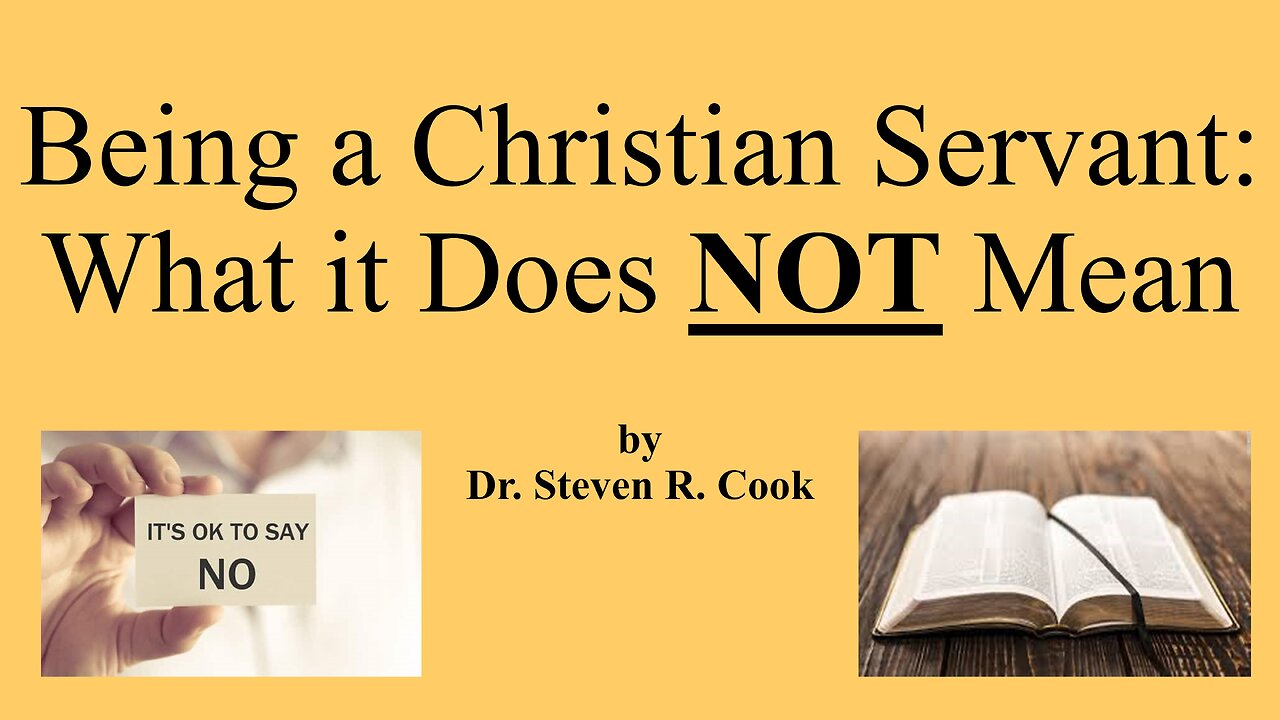Premium Only Content

Being a Christian Servant: What it Does NOT Mean
Being a godly servant glorifies God, benefits others in their walk with the Lord, and helps us advance to spiritual maturity. Having a servant’s heart is in line with that of our Lord, Jesus Christ, who said, “For even the Son of Man did not come to be served, but to serve, and to give His life a ransom for many” (Mark 10:45). Jesus, when speaking to His disciples, said, “The kings of the Gentiles lord it over them; and those who have authority over them are called ‘Benefactors.’ But it is not this way with you, but the one who is the greatest among you must become like the youngest, and the leader like the servant” (Luke 22:25-26). Paul wrote, “For you were called to freedom, brethren; only do not turn your freedom into an opportunity for the flesh, but through love serve one another” (Gal 5:13). And Peter wrote, “As each one has received a special gift, employ it in serving one another as good stewards of the manifold grace of God” (1 Pet 4:10). No greater picture of servanthood can be found than when Jesus, the King of kings and Lord of lords became the Servant of servants and washed the disciples’ feet (John 13:1-17). But service to others can happen only when they are open to receiving what is offered. Jesus offered truth and love and grace to others (John 1:14; 14:6), but He was rejected by the majority of those who saw and heard Him (John 1:11; 3:19; 5:39-40; 12:37; Matt 23:37). Being a Christian servant means being obedient to God first, following His Word and walking with Him. Below are a few examples of what being a Christian servant does not mean:
1. It does not mean we help others commit sins contrary to God and His Word. God’s people have a duty to say “No” to others who seek to lead us into sin (Dan 3:16-18; Acts 5:27-29); however, this should be done respectfully (Dan 6:1-10, 20-21; Acts 23:5).
2. It does not mean we have to expose ourselves to unnecessary harm. Sometimes it’s valid to hide to avoid harm (1 Ki 18:13; Acts 9:23-25; John 8:59; 2 Tim 4:14-15). However, if avoidance is not possible (like Stephen in Acts 7), we are to commit ourselves to the Lord (1 Pet 2:21-23), bless rather than curse (Luke 6:27-28; Rom 12:14; 1 Pet 3:8-9), and trust that God will dispense justice in His time and way (Rom 12:17-21; 2 Th 1:6-7). This is executed by faith and not feelings.
3. It does not mean we have to interact or befriend people who are hostile to God (2 Tim 3:1-5). Solomon said, “Do not associate with a man given to anger; or go with a hot-tempered man, or you will learn his ways and find a snare for yourself” (Prov 22:24-25). Scripture also states, “do not associate with a gossip” (Prov 20:19), and “do not associate with rebels” (Prov 24:21), for “Bad company corrupts good morals” (1 Cor 15:33; cf. 1 Cor 5:11). Choosing our friends carefully is important, for “He who walks with wise men will be wise, but the companion of fools will suffer harm” (Prov 13:20).
4. It does not mean we forfeit the right to defend ourselves physically or legally when we come under attack. In Scripture there are examples of believers who at one time defended themselves or others, but then at other times fled and/or suffered for their faith. David, who killed Goliath (1 Sam 17:48-51), twice fled when Saul tried to kill him with a spear (1 Sam 18:11; 19:10), and refused to retaliate, even when he had opportunity (1 Sam 24:4-6). Paul, who at one time took a beating with rods (Acts 16:22-23), later used legal force by exercising his rights as a Roman citizen to protect himself from a flogging that might have killed him (Acts 22:25-29). And Paul eventually appealed to Caesar, hoping to gain a just trial (Acts 25:7-12).
In summary, we are called to have a servant’s heart and be willing to give of ourselves to help others know the Lord and walk with Him. However, only the person who is positive to God and has a humble heart will accept and benefit from what we offer. Wisdom helps us identify those who are humble.
-
 1:12:59
1:12:59
Thinking on Scripture
2 months agoKnowing and Doing the Will of God - Part 4
371 -
 9:53
9:53
Rethinking the Dollar
20 hours agoWhen Detroit Bleeds, America Suffer! Layoffs Have Begun
6.12K6 -
 18:36
18:36
Clownfish TV
23 hours agoYouTube Just NERFED YouTube Gaming... | Clownfish TV
2.43K13 -
 10:26
10:26
Silver Dragons
17 hours agoSilver is TAKING OFF Around the World
6.77K3 -
 1:36
1:36
From Zero → Viral with AI
1 day agoAI in Content Creation & Discovery – The New Era of Marketing
5.42K -
 1:20:10
1:20:10
FreshandFit
11 hours agoMiami Halloween Street Debate
204K101 -
 2:06:16
2:06:16
TimcastIRL
15 hours agoTrump Calls For NUCLEAR OPTION, END Filibuster Over Food Stamp Crisis | Timcast IRL
221K179 -
 3:58:54
3:58:54
SavageJayGatsby
12 hours ago🎃 Friend Friday – Halloween Edition! 👻🕷️
56.1K4 -
 16:16
16:16
Robbi On The Record
12 days ago $22.02 earnedThe Dark History of Halloween | What You Should Know
72.1K70 -
 58:18
58:18
Flyover Conservatives
1 day agoThe Truth About Halloween that You DIDN’T Know - Holiday Special - Historian Bill Federer | FOC SPECIAL Show
67.9K11